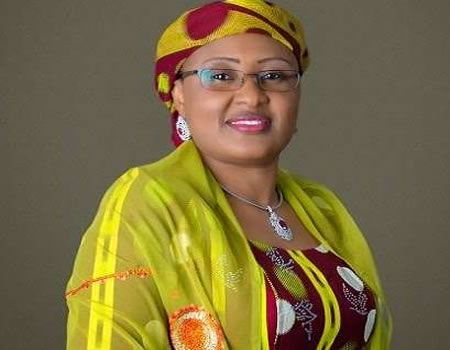The First Lady, Mrs. Aisha Buhari, has lamented the low level of utilization of the country’s over 10,000 species of medicinal plants, despite its enormous requirements for the production of medicines, cosmetics and other essential products.
She therefore expressed the commitment of the current administration to boost the commercial cultivation of these plants for health, economic and social benefits as well as for the creation of wealth and employment for the teeming youth of the country.
She spoke on Saturday at the Traditional, Complementary and Alternative Medicine (TCAM) conference organized by her office in collaboration with the Federal Ministry of Health in Abuja.
Mrs. Buhari pointed out that TCAM has been recognized by the World Health Organization (WHO) as a very important health service delivery system alongside other practices such as acupuncture and Ayurveda which have now been adapted from other countries for use in Nigeria.
According to her, this has opened up other healing options than conventional medicine.
While noting that the Conference was taking place at a time when people were looking for alternatives and moving towards natural products, she added: “Nigeria is blessed with over 10,000 species of medicinal plants of which less than 20 % are used. These valuable bioresources, often referred to as “green gold,” can be harnessed for the production of medicines, cosmetics and other products to benefit our population.
“This conference is part of this administration’s agenda to boost non-oil exports, which will lead to the commercial cultivation of medicinal plants for health, economic and social benefits. This is for the sole purpose of providing wealth and creating jobs for our youth and women.
“The COVID-19 pandemic, which has crippled countries’ health systems, has opened our eyes to the need to look within for possible cures and brought to the forefront the importance of TCAM.
“It is well known that during the pandemic, even before the discovery of the vaccine, Africans used their local herbs to manage symptoms. »
The First Lady informed that the conference, whose theme was “Indigenous Medicinal Plants of Nigeria – Health Benefits and Economic Potentials”, aimed to showcase and recognize the country’s indigenous medicinal plants.
She hopes that its recommendations will lead to the implementation of the gradual integration of TCAM into the health care delivery system with a view to achieving Universal Health Coverage (UHC), early adoption of the bill of the TCAM Council to regulate the practice and products, and the establishment of a market for Vegetables, Fruits and Herbs of fresh, semi-processed products and raw materials for women.
Other goals she wanted to achieve included land for women to grow medicinal plants and vegetables for their empowerment, training and retraining of practitioners, and protection of their intellectual property rights.
She advised the wives of state governors to embrace the initiative and implement it at the state level, while asserting that the Federal Government would continue to provide a necessary and conducive environment for the development of CAMR.
In his speech, the Minister of Health, Dr. Osagie Ehanire, assured that the Federal Government would facilitate the large-scale adoption of traditional and alternative medicine into orthodox medical practice.
While stating that traditional medicine was all the country had before the emergence of modern medicine, just like other cultures, he noted: “Continued interest and research in traditional medicine is the right path to follow to continue the development of these ancient herbs in Nigeria.
“Now is the time to use the knowledge and skills of ancestors passed down from generation to generation for greater value addition. In line with this administration’s aspiration to explore all avenues for proper healthcare, the Federal Ministry of Health will remain committed to supporting initiatives that promote TCAM in Nigeria.
“It is instructive that a high percentage of Nigerians still seek and use traditional medicine in addition to orthodox medicine. I hope that this conference will deliberate on the opportunities hidden in traditional medicine that can be adopted into our orthodox practice. »
Professor MacDonald Idu, Professor of Phytomedicine at the University of Benin, who delivered the keynote address at the conference, said if properly harnessed, the value of traditional medicinal plants in Nigeria would reach N1 trillion by 2025.
He puts the current value at a conservative estimate of N200 billion, regretting that little attention has been paid to the exploitation of the sector.
“We talked about $200 billion. It’s conservative. I’m serious. Other forms of literature, which I have also read, will reach around 1 trillion by 2025. I know what that means. That’s a lot of money,” he said.
“Nigeria, I’m sorry, we don’t keep our word. We talk a lot, but we don’t really walk the talk. So my own goal is to make our people understand that we need to diversify our economy.
“We have no reason to be poor. This is the real truth. We have no reason to declare everything we need to survive. It’s already there. Why do you have them here?
“So I believe that if we are able to re-establish that platform, and we are then able to organize ourselves and organize the practitioners and the producers of traditional medicine, we should be able to collect enough money so that this country can move forward. . In fact, that’s what worries me,” Professor Idu added.
IN CASE YOU MISSED THEM Nigerien TRIBUNE
underutilized traditional medicinal species… underutilized traditional medicinal species…
